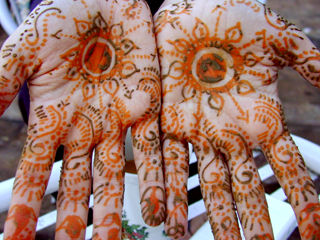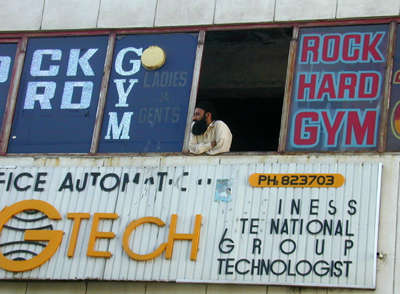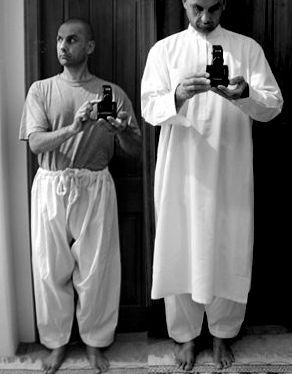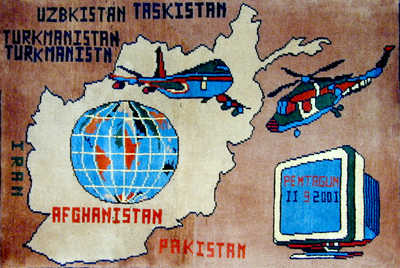|
|

|
||||||||
|
|
Present Past Subjects Projects Misc |
SEPTEMBER 2002
Too Immersed to be Interpreted I finally tracked down a copy of Pasolini's Arabian Nights (Il Fiore Delle Mille e Una Notte) yesterday. I started to watch it yesterday evening but found it so extremely exquisite that I couldn't bear finishing it (I suppose I managed to watch a bit more than one third of the film). Later I found this quote from Pasolini (which I suppose refers to the scene where Haroun al-Rashid and his concubine watch two young people make love): "The pleasure of someone watching a sexual act recreated -- of which he has personal experience -- consists also in the pain of knowing that at that very moment he is fatally excluded from it. Watching a love scene recreated is thus like looking at something lost which has now returned, something dead which had now come back to life. It is an acknowledgement through reason of something previously only experienced through the body. It is a re-reading with the objective -- but not unmoved -- eyes of the scholar of a text too immense to be interpreted." (From 'Pier Paolo Pasolini: A Future Life') Ha. Ha. I initially mis-read the last line of the above as "too immersed to be interpreted." I suppose this is because it rings true for me. In my case immersion is definitely something to be feared. Oh fuck. Racing around with my head in the clouds (writing reports 9 months late, booking appointments, flights etc.) I nearly collided with a car and fell off my scooter, scraping my knee and badly bruising and spraining my hand. Event Horizon One must try very hard not to feel too trapped within the event, especially if the event's horizon consists solely of looming deadlines and gargantuan 'to-dos'. At first view the structure of Pasolini's Arabian Nights seems to revolve around his treatment of the Tale of Aziz and Azizah upon which translator Burton remarks:
We note that 'Patient Griselda' is the title of the tenth tale told on the tenth day of Boccaccio's Decameron and the central figure in Chaucer's Clerk's Tale (the Decameron and the Canterbury Tales being the other two 'books' explored by Pasolini in his 'Trinity of Life' cycle). Woot! Exactly two weeks from today (God-willing) I should be sitting in a house half-way between India and Afghanistan. More marvels:
Nina writes and includes this note:
I am slow. Nine months after Block 15 formally ended I'm reading the participant's reports and writing short responses and comments (my own reports). Obviously this should have been done months ago but I've been stubbornly trying to prove one of Block 15's starting premises: namely that certain events increase in significance as they recede into the past. The question of course is whether or not Block 15 actually belonged to that particular species of event. (And whether or not what I am now writing is more meaningful now than it would have been then.) But sometimes I have fun. For example while reading Thomas Johannsen's paper the following passage jumped out at me demanding attention (Thomas is writing about reflections as 'Quantum Others' seen in the mirror):
Aaiii... Thomas's paper also cites the 'it always makes sense' adage of Richard Foreman. (In full: "Understand -- it always makes sense -- if at first it doesn't seem to then wait, and sense will always establish itself.") The mind is a marvelous thing no? Faulkner: "Maybe nothing ever happens once and is finished." When is a story not a story? Life in the Semi-Autonomous Zone From Dawn:
My copy of Naddaff's Arabesque: Narrative Structure and the Aesthetics of Repetition in the 1001 Nights has arrived. From the back blurb: "Using the 'Porter and the Three Ladies of Baghdad' sequence as a paradigm, Naddaff investigates the ways narrative can, in certain circumstances, become non-representational." (Almost finished writing those reports.) "O brother... thy story is right strange; were it graven with gravers on the eye -corners, it were a warner to whoso would be warned." (From the 1st Night: 'The Tale of the Trader and the Jinni') Notes Concerning The Great Story
(Reports finished and handed in. Ta da!) Andrea Paciotto, who has been doing a project on 'indifference' at DasArts (and who I've been working with the last few months as mentor), completed his project today by inviting a number of staff members to his house and 'spoofing' a full confession. Seemingly beside himself with stress, Andrea claimed his entire project was based on a lie, a lie which had now gotten out of hand, for the person who he had lied to had suddenly arrived from Belgrade demanding satisfaction. And if that wasn't bad enough, this person was about to join us. What should he do? Congratulations to Andrea and his two confederates for producing a convincing dilemma which addresses his interest in such a thought provoking fashion. Thomas Johannsen sent me a mail pointing out this page which claims that the 'original' Ocean of Story (Kathá Sárit Ságara) was usurped by the Brahmins and altered to reflect Brahmin ideology. At the Rijksakademie today I visited the studios of Chikado Watanabe, Stani Michiels and Ivan Grubanov. This evening N. and I attended Isabelle, Stefan, Frank and Dan's production of J. G. Ballard's Concrete Island. When I saw the cricket bat lying in the trunk of the taxi I was immediately charmed, but thought I should better check... "Is this yours?" I asked the driver. "Ja." he said. Cool! I thought to myself. The taxi driver plays cricket! Walking to the door I said to N., "He plays cricket." "I think it was for self-defence." she said. After picking up the visa I will need we carry on to Scheveningen beach and gorge ourselves on sand, sun and wind. The Locked Room In a note concerning demons locked in bottles ('The Tale of the Fisherman and the Jinni') Burton writes: "This alludes to the legend of Sakhr al-Jinni, a famous fiend cast by Solomon Davidson into Lake Tiberias whose storms make it a suitable place. Hence the 'Bottle Imp,' a world-wide fiction of folk-lore: we shall find it in the 'Book of Sinibad,' and I need hardly remind the reader of Le Sage's 'Diable Boiteux,' borrowed from 'El Diablo Cojuelo,' the Spanish novel by Luiz Velez de Guevara." See too M. R. James' Solomon and the Demons ("Every night when I go to bed, something comes and sucks my right thumb...") from his 'Old Testament Legends' (1913) and The Testament of Solomon translated by F. C. Conybeare from a Greek text produced between the 1st to 3rd centuries A.D. Retrospect Awareness A week of public and private anniversaries. Funny how Day 0 of last year's DasArt's block has turned into a day to be remembered... and for something that I was unaware of at the time. (After watching Jalal Toufic's 'Ashura: This Blood Spilled in My Veins' yesterday evening at the opening of the Contemporary Arab Representations exhibition at Witte de With.) What does it mean that we and everything around us, that is each and every thing, lies between a here and a there, between this place and that place, between this present and that past (in the case of Ashura, an event which occurred 1322 years ago) -- between this present and that future? What is the effect of all these memories? All these perceptions? June 5th 2001: "Who said time heals all wounds?" I've decided today is going to be an excellent day... The Garden of Forking Paths
N.'s just arrived in Córdoba and I'm just about to leave for Islamabad. Both of us are planning to be away for about 3 weeks. Everyone else seems to be staying pretty much at home. (Displacement map courtesy of Mr. Lira.) (Islamabad)
Aliya's hands Why is it only in-flight that the body finally realises where it is actually going? (One feels this as a physical change -- the body finally awakening to where the mind has sent it.) For me this happened last night as the plane flew up the Arabian Gulf from Abu Dhabi and passed over Afghanistan. It was dark outside and there were lights twinkling below. On the video screen the map said: Qandahar. Click! (Islamabad) Yes, I'm in the land of Indian cinema and pirate DVD's. Today I started my collection with a classic: Nitin Bose's Deedar (1951) starring Dilip Kumar. (Islamabad)
Rock Hard Gym The film which A. chose to watch this evening coincidently turned out to be based on Robert Louis Stevenson's 'The Suicide Club' (from his New Arabian Nights) and contained a love-death dilemma similar to the Nights story which I'm currently reading: The Second Kalander's Tale. (Islamabad)
Identity Workshop (Islamabad) I've been busy researching and collecting Indian films -- but my God, what a mind moggling task! For where does one begin when confronted with such a vast and unknown world? A week ago my knowledge was limited to the offerings of two major directors: Satyajit Ray (especially his Apu Trilogy) and Mrinal Sen. Now I can add at least one other 'art-house' director, Ritwik Ghatak, and a whole slew of early (and mid-) Bollywood greats to my list of recognised names, including: Nitin Bose, K. Asif, Guru Dutt, Raj Kapoor, Bimal Roy, Ramesh Sippy. Director Ritwik Ghatak on film making: "Film is not like any other art," he once wrote. "It is something totally for drudges to be making. When you are engaged in making, there is no scope for the luxury of dreaming. In fact, there is all the chance of making a hash of it, with, on the one hand, the sheer physical strain and the hassle of chasing a whole medley of people with the most diverse dispositions to run, willy nilly, towards the same goal; and on the other hand, the financiers baring their fangs at every point; and on yet another hand, the responsibility of completing the stuff on time. Unlike other arts, there'll be too much to pay if one chooses to get moonstruck and stay agape. There is all likelihood that the film will get entirely mucked up in the process. One has to smuggle one's vision in through this process surreptitiously. How can one do it unless one has a lot of conceit?" (Islamabad)
War Carpet 10 years ago, when I last visited this city, I purchased 2 'war carpets', unique prayer carpets knotted by Afghan refugees portraying the struggle between the Mujahiddin, the Afghan freedom fighters, and the Russian invaders. (Think: Rambo III.) Yesterday in the F-6 market I spotted a new 'war carpet,' with a similar motif but this time including the events following September the 11th, 2001. Here the story's charm takes a strange twist -- for what once was appreciated as heroism has now turned patently evil -- resulting in a cultural artifact which verges on pornography. (Islamabad) Visited the National Puppet Theatre in Rawalpindi this afternoon. The state of the 'National' theatre and the chaos which is 'Pindi' came both as a bit of a shock. (Islamabad) An Indian love story in a haunted house. Mahal (1949), the film we watched last night, is fascinating not only because a ghost story in a culture that completely accepts the idea of reincarnation is bound to be different -- especially when it has been filmed in high expressionist style by a German ex-pat cameraman -- it is fascinating because on many counts it might just as easily have been called, 'Last Year in Allahbad.' Mahal (at Upperstall.com 'a better view of Indian cinema'). (Islamabad) Revolutionary stomach. (Islamabad) Symmetry in Relations
The Tale of Nur-al-Din Ali and his Son Upon the death of the Wazir, his two sons, Shams al-Din Mohammed (the elder) and Nur al-Din Ali (the younger) are jointly appointed by the Sultan to be his successor...
(Islamabad) Strange (for me) to be here and going to a party put on by Germans. (Islamabad) Restless night. Restless thoughts. Maybe this is why this morning I was irritated, for the first time since my arrival, by the 5. A.M. call to prayer, broadcast from at least half a dozen mosques in the neighborhood and got up and shut all the windows. A few hours later a street singer, an old woman, walks down the street singing the most beautiful song (I later understand that it is a religious song) pausing under the same windows. Without her noticing I shoot some video from one of the windows and the terrace. Money is sent out to her. She walks away and about half an hour later returns. Upon hearing her again I decide to go out and shoot some more video. Reviewing the tape later I realise the first shots, shot from above, were by far the best.
ALAMUT.COM is artist owned and operated.
|
|
||||||




